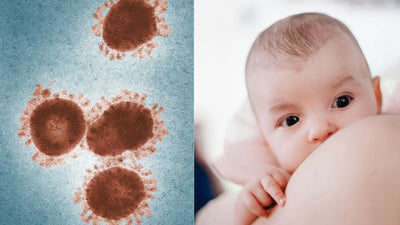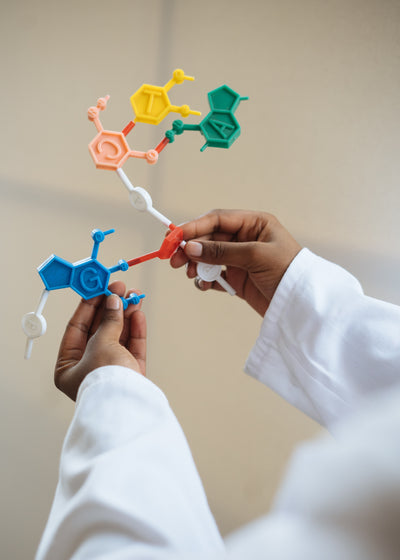How Breastfeeding Protects Babies’ Immune Systems
How Breastfeeding Protects Babies’ Immune Systems
By Jordan Berns
Everyone knows that moms are superheroes when it comes to protecting their babies, but did you know that mothers’ breast milk can protect babies long after they leave the cradle? On the surface, it looks like breast milk just feeds your baby, but it’s actually helping them ward off illnesses while setting them up for long-term health. This is done through the transfer of powerful antibodies, which are Y-shaped proteins made by our immune systems to shield us from harmful viruses and bacteria.
Breast milk changes throughout your child’s nursing years, adapting to the needs of a growing body. The breast milk that arrives immediately after giving birth is called “colostrum.” This thick, almost yellow milk differs in genetic makeup from the milk known as “mature milk” that comes in later. Colostrum is rich with virus and bacteria fighting antibodies that help your newborn baby prevent and battle illnesses like a champ. Even though mature milk has fewer antibodies, it still comes with unique safeguards. Breast milk has an impressive content of white blood cells that help fight infections. It also contains the proteins lactoferrin and interleukin-6, -8, and -10, which help stimulate the immune response.
Breast milk gives babies immunity that can last their whole life long!
Immunity derived from breast milk is called “passive immunity,” because the antibodies are only transmitted to your little ones, without them having to make much of their own quite yet. “Active immunity,” or when children are able to fully generate their own substantial immune system, kicks in at around 7 to 8-years-old. In fact, breastfeeding isn’t the only type of immunity that mothers give their babies. The last three months of pregnancy are crucial for a fetus’s immune system. During this time, mothers pass on antibodies, specifically immunoglobulin (Ig) G, to her baby via the placenta. Premature babies who don’t get these last three months can be more susceptible to illnesses.
Passive immunity from the womb is extended through the breastfeeding process. Passive immunity can even include protection from chickenpox, if the mother had contracted it at some point. However, this type of immunity is not permanent. Most passive immunity fades away after 6 to 12 months. This is why the chickenpox vaccine is so important, and all vaccines that usually start at around two months old. The passive immunity for Whooping Cough and Hib (haemophilus Influenza type b) declines the quickest. Babies have passive immunity to rubella, measles, and mumps for around a year. This explains why babies get the MMR vaccine after they turn one.
Scientists back the immunity-giving powers of breast milk.
In breast milk, there are significant amounts of antibodies called secretory Ig A (sIgA). Ig A stops the spread of infectious diseases and lowers tissue inflammation. These antibodies have the superpower of attaching to possible pathogens to keep them from latching onto healthy cells and infecting them. Colostrum has 5×106 leukocytes cells per 1 mL (cells that help the immune system overcome illnesses). The number of leukocytes decreases as colostrum transforms to mature milk.
Breastfeeding also has an important impact on the thymus (the central part of the immune system that creates T cells). T cells are white blood cells that attack dangerous intruders to the immune system. The thymus, located by the heart, helps develop T lymphocytes, weeding down potential immature T cells to an elite 5% that go on to protect the whole body. Ultrasound studies of babies’ thymuses revealed that exclusively breastfed babies had substantially larger thymus glands than their non-breastfed counterparts after four months postpartum.
Babies who are breastfed are less susceptible to diarrhea, ear infections, urinary tract infections (UTIs), pneumonia, and several types of meningitis. Babies who breastfed for six months or longer have fewer cases of lymphoma and leukemia. Breastfeeding also increases babies’ strength in combatting respiratory illnesses. According to a study from the American Osteopathic Association in April 2006, breastfeeding can also help prevent future allergies as children grow older. Some scientists suggest that babies who are not breastfed are more likely to have health issues such as Crohn’s disease and diabetes. In 2004, a Pediatr Allergy Immunol study revealed that breastfeeding stimulates the production of CD8-positive T cells, which not only helps fight infections, but also can pinpoint and attack tumors.
Women have breastfed all through the pages of our history as a species, but only now are we learning of its super capabilities. We are also becoming more aware of how all mammals have milk unique to their kind that ensures their offspring grow up to be strong and healthy. For example, human breast milk has much higher levels of complex sugars than cows’ milk. As science delves deeper into the fascinating science of breast milk, we learn more about not only what to feed and nourish our babies, but the hidden secrets to our own biology.




